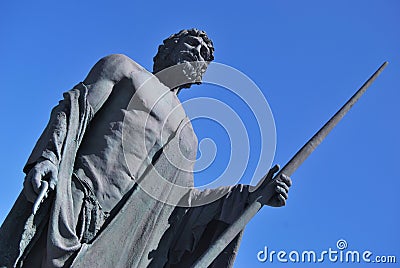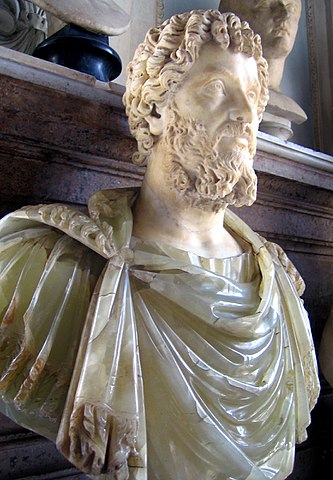A friend who started reading my manuscript asked me this question recently, and it caught me by surprise.
I had a good picture in my head of most of the characters. But I used physical description sparingly in my manuscript because, as a reader, I like letting my imagination shape my view of a character’s appearance.
The exception is when there’s some well-placed, evocative trait. I’m reading David Malouf’s RANSOM now, and Hermes’ “golden hair hanging in ringlets” is a great example.
But the question made me realize I had taken a lot for granted with my readers. Atlantis conjures up a huge range of images, from extraterrestrials to mermaids. So the ancient world sensibility I was trying to get across may not be immediately apparent even though the character and place names should be familiarly ancient world—Greek and Egyptian in particular—to some.
The main character is named Aerander. His love interest is Calyiches. His nemesis is the High Priest Zazamoukh.
Without geeking out too much (hopefully), let me explain that the inspiration for my Atlantean world comes from the cultural diffusion theory proposed by Lewis Spence. Atlantean civilization began around the 10,000 B.C.E.. It declined ten centuries later, and was destroyed by natural disasters and invaders from Western Europe. Were there survivors and what happened to them are questions that my novel THE SEVENTH PLEIADE seeks to answer.
According to Spence, Atlantis was located in the vicinity of the Canary Islands, where conditions were optimal for a flourishing Neolithic civilization. Its evidence lies in the spread of an “Atlantis culture complex” most notably to North Africa, Mediterranean Europe and Central and South America.
My premise is the Atlanteans migrated from the Iberian peninsula—though they claimed to be descendants of titan gods—and they came into contact with Northern and Western Africans (who I call Mauritanians and Tamanans), Northern and Southern Americans (who I call Lost Pangeans and Lemurians), and Europeans (who I call Azilians).
As such, Atlanteans and their contemporaries wouldn’t have looked much different than ancient world peoples, or us modern day folks for that matter.
Atlanteans didn’t have blue skin or gills or fishtails.
An interesting theory is the Atlanteans are ethnically linked to the ancient Guanches and Berbers whose origins have been elusive to anthropologists.
The Guanches were first described by a 12th century Arab geographer Muhammad Al-Idrisi who visited the Canary Islands and found a mysterious indigenous population. He wrote about visiting a village: “whose inhabitants have long and flaxen hair and the women are of a rare beauty.” No one knows how the Guanches came to arrive on the Atlantic island.
Similar to the ancient Berbers (who lived in the evocatively named Atlas Mountains of Northern Africa), the Guanches are described as physically distinct from their Mediterranean and North African neighbors. They were tan in complexion but tall in stature and tended to be fair haired. These characteristics lend themselves to a rich mythology, which I propose the Atlanteans capitalized on. They were the sons of gods, the “chosen ones.” With their high-minded claims to heredity, they managed to colonize the pre-historic world.
Here are some of my references for what the Atlanteans might have looked like.
- A young woman of Guanche descent

French star soccer player Zinedine Zidane, of Berber descent

French actor Fu’ad Ait Aatou of Berber descent





French star soccer player definitely looking atlantean to me…yummy!
Yes Liz – I agree!
I also have an idea about whar the atlaians may have looked like. yes sons of gods. gtall, the bluest of blue eyes, hair that white color depicted of aliensthey were very inventive,mysticzal. their land sunk due to their inventions,
I have had a story for a very long time. I want to write it. but just havent got started
my idea is they transformed to mermaids& mermen, it they were giants 10-12 feet, well I will have to think on that one. as for dolphins, they were the protectors of Atlantis, also the big whales. this race was very technological, their neculear, atomic heat was part of the cause of the island to be destroyd. Lemura was mystical and spiritual. ( sorry my imagination at work here)
My Idea is that considering that they were in Africa (Mauritian) they may not have been as pale as most would love to imagine. I know it’s a popular thing to pretend that all of North Africa has always been completely Caucasian but that is historically inaccurate.
The berbers of atlas mountains and riff are short in stature. Atlanteans were giants.
Hi Silvia – Thanks for stopping by. The Atlantean giant theory sounds familiar though I’m not sure what the source is. It’s not mentioned by Plato, Lewis Spence, or Edgar Cayce, or DC Comics for that matter. In the recent Aquaman movie, Atlanteans are depicted as having super-human strength but not particularly bigger and taller than humans.
I believe in the McMillin Media blogs on Atlantis. That pre-Berber tongues were the most similar to the ancient Atlantean languages. The Iberians and Basques of Spain, the Guanches, certain east coast Native Americans and Berbers (Tuaregs, Fulanis, Peul, etc.) are descendants of the Atlanteans. If you read African Moors by Dana Marnicke, that author will tell you that the original Berbers were black. Therefore, the ancient Atlanteans were a ‘very’ dark skinned race. This is true, especially since white skin did not appear in the world until the last 7 to 9,000 years ago. There rarely have been people of the same nationality (ethnicity, country, continent) that have been of the same complexion. The Atlanteans probably ranged in color from a dark mediterranean to a nearly jet black hue with red highlights (mahogany). It was a tropical island continent. People of a lighter skin color could not have done very well with the heat. Your theories are eurocentric oriented. The darker skinned people have always dominated this planet.
Hi Rosalyn – Thanks for stopping by and sharing your ideas. Let me first say, I’m a fantasy author who has done some research on cultural anthropology and ancient world geology and human migration, but I don’t claim to be an expert in anything related to the prehistoric world. I wrote this article several years back just for fun speculation, and I’m delighted that it has attracted fans of Atlantis lore like myself. I should also disclose, I’m not a true believer that Atlantis ever existed. I guess you could call me an Altantis agnostic. 🙂
I agree with you however that Atlantis lore most certainly is a product of European culture and imagination, from Plato to Ignatius Donnelly to Lewis Spence who piqued my interest in particular. It has therefore most definitely been skewed to European sensibilities, including the claim that Atlanteans must have looked like Europeans. We see this in the recent example of the Aquaman movie with Nicole Kidman playing an Atlantean queen. I think it would be very interesting to see more stories about Atlantis populated by dark skinned people.
Are you familiar with the book Atlantis and the Silver City by Peter Daughtrey? He promotes evidence for the Iberian Peninsula (southern Portugal in particular) as a part of the Atlantean peninsula (that hadn’t sunk yet as everything else did.) I’m just curious if your inspiration for that tidbit came from his book (or other ones touting the same idea?)
Hi Julya – Thanks so much for stopping by my site!
I have heard of Peter Daughtrey’s book, but I have not read it. And I have heard, through my research, the theory of the Iberian peninsula, most recently through the archaeological study of the Dona Ana mudflats; that actually goes back to 2011, so it’s not so recent actually!
But no, I went with old Lewis Spence’s predominantly anthropology-based theory that the most likely location for Atlantis is the Canary Islands. There’s just about zero archaeological evidence that a pre-historic civilization existed there, but I was inspired by Spence’s own imagination: his theory of an Atlantean culture complex diffused from Eastern Atlantic between Spain and Northern Africa. He thought the native Guanche people of the Canary Islands were the most closely related to the Atlantean “race” based on their religious practices and language. Writing fiction, that theory was just fine for my purposes. 🙂
In fact my theory is more all embracing . The remnant that is left stretches from Gibraltar westwards along the Andalucian coast to the South West tip of Portugal. The largest part was the great plain in front of this coast towards Morocco which was inundated and now seabed. It also includes North Morocco and the Atlas Berbers. The Canaries were part of the Island empire that Plato said stretched across the Atlantis So in many ways we agree. This .is the only theory that matches all sixty clues left us by Plato. Most theories barely match six.
Hi Peter!
I’m quite honored that you stopped by to comment on my site. I agree, there’s something irresistible about Plato’s oddly detailed account of ancient Atlantis. It definitely inspired me as well, and I look forward to reading your book.
I remember reading for example that Plato’s measurements of the island continent (in stadia) suggest a huge land mass, which would have been far greater than the Canary Islands. But then he also spoke of the continent being mountainous, hence the theory that the tall, volcanic Canaries are merely the mountain tips of what were once great heights above the ocean.
The debate of course is how reliable Plato’s account could have possibly been. He describes a story passed down several generations–an oral history–so it stretches belief that his description was exact. I still find it fascinating, and as a fantasy author I don’t mind approaching the story from a mythological angle versus scientific evidence.
I agree a bit with Antoine. I imagined Atlantos being at a time before white people existed as an identity or phenotype. Europeans 12,000 years ago had black hair and brown to darker skin, often tawny. Some had odd eyes that may’ve looked blue or green.
Atlanteans are often considered part of this “Cimmerian” Cro Magnon race but I swear the Greek Plato based them on Persians or ancient Egyptians. I imagined them being four races or tribes of an island the size of Texas with smaller island around it, closer to the Caribbean. I imagined the biggest races being a North Race, brown skinned and brown eyed with darker hair and vaguely Berber or European, a central group with black skin, hair and eyes and a Proto Mende or Wolof form and a western Island race similar or descended from Native Americans with Mexican or ancient Caribbean looks. Some red-skinned Africans similar to Nama people lived in south Atlantis.
… At this time the ancestors of blond Europeans were brown haired Dinaroids in the East Alps and Balkans. Atlanteans would settle parts of North Africa and Egypt but true (Cro Magnon like) Egyptians would wipe them out, this was well aft their islands had been destroyed.
Also, they had little influence on Europe which itself was developed by Anatolian grain farmers and Russian horsemen (actual Aryans). Africa was not very influenced from Atlantis either with a mix of Natufian Arab groups, Sahelic Afro Asiatics and “Negro” Proto Niger-Congo groups, none of which were Nilosaharan (Sudanic, Kenyanic) like the later Gao who settled in W Africa.
By 5,000 years ago, the island nation in the west was all but forgotten and irrelevant.
I would like to add that Atlanteans had vivid blue eyes.
This genotype still exists today, but we don’t call them Atlanteans, we call them Nordic. And indeed, they ARE the children of the Norse gods !
This is not to be confused with giants, who were direct descendants of the gods, but Nordics were a hybrid of Neanderthals and “gods”.
Also, not to be confused with brown eyed people, whose ancestry leads to a similar genetic splicing, well documented, that happened in Sumeria. The children of those “gods”, are the Jews.
But they are NOT the same gods.
And so begins the greatest story never told !
Rosalyn, Berbers weren’t negroid. In fact, Berbers are mostly White to this day. Afro-centrics are delusional. Dark skin means very little, a dark skinned Dravidian has no negro blood. You can be black as midnight and not have a drop of negro in you.
My view is that down through history is that you have it all wrong.
When I look at the map of the world and see no island to the west of “the pillars of Hercules” and the myth that the island was lost in the sea I wonder if that was just a cop out by the original story teller.
In fact if you look at the map of the world and see that the bits, the pillars, that Hercules and Atlas are holding up the known world are the Americas and Africa.
There is only one large island between the pillars, the antediluvian world, the island down under with a prominent mountain, feature, in the middle, beyond enormous wealth in minerals and agriculture, that is today known as Australia. Indeed parts were once under water and the continent is very old.
You need to think bigger and further back in time!
I’m a fanatic of Guanches civilisation. I always felt a strong bond with Tenerife at the point I’m really convinced in another life I lived there. That said, I’m very happy to see you’re affirming the Guanches were the Atlantis inhabitants as I really think you’re right! They were described as anomalous appearance compared to the other civilisations. I read someone supposes they’re originally from the north Europe (maybe Scandinavian) because they were tall, blue eyed and clear skinned, that is exactly the opposite of Africans. However, your theory sounds more likely to me. The only controversy is how the Conquistadores won against them if they were so technologically advanced as they say?
Allessio, I would speculate that by the time the Conquistadores “discovered” the Canary Islands the Guanches only had their myths and legends about their ancient civilization but the actual knowledge of their technology had long been forgotton.
My wife is an author who also taught history for 20 years. She has recently written a historical fantasy novel (600 pages) titled Atlantis Land of Dreams under the pen name Edale Lane which is available in paperback, hardcover, and Kindle via Amazon. As a historian, she discovered that in the ancient world the term “race” held a different meaning than it does in more modern times. It meant “nationality”, though they didn’t have nations like ours. So regardless of skin, hair, eye color or other physical traits, “race” meant what country you were from. There were black, brown, and white Greeks, black, brown, and white Egyptians with no “racial” divisions. Her theory is that Atlanteans were comprised of all the physical types that were found in the Mediterranean world and beyond, such as Mesoamerica and Northern Europe.
That’s a very interesting point, Johanna. I’m aware that people of the ancient world thought of race and skin color differently (though there’s evidence that there were prejudices against darker skinned people within Greek, Egyptian, Near Eastern and Roman cultures). One theory about Plato’s story of Atlantis is that it was nationalistic propaganda, in fact, proving that the Greeks descended from a superior civilization, or race, if one could call it that. The Greek word for foreigners (barbaros) translates to barbarians and was used to describe people from as nearby as the Italian peninsula and Asia Minor and as far as Africa and modern India. I’m not an ancient world historian as your wife is, so I can’t say if barbaros carried the same pejorative connotation that it has today. It does seem to imply a sense of insularity and superiority.
Realistically, if Atlantis did exist, sometime before 10,000 BC, I agree that it was likely a cosmopolitan society and would’ve included residents of many different races. Thanks for visiting and chiming in on the discussion.